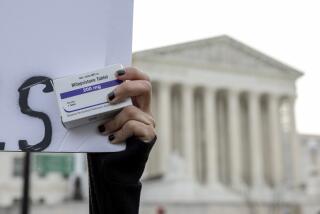Murky Merck
Today is going to be rough for Merck & Co. Chief Executive Raymond V. Gilmartin. Senators will grill him mercilessly at a hearing about why his company failed to pull its pain-killing drug Vioxx off the shelves despite numerous studies connecting it to heart attacks.
Gilmartin deserves to be on the hot seat, especially given the internal Merck e-mails published by the Wall Street Journal indicating that company officials knew for years that the drug increased heart risk. But leave room on the grill for officials of the Food and Drug Administration, who clearly failed in their regulatory duties -- not to mention members of Congress, who haven’t given the FDA the power it needs.
Merck, for all its apparent disregard for the safety of its customers, was just doing what one expects corporations to do: looking out for the bottom line. That’s why the United States has regulatory agencies.
The FDA should have seen early on that Vioxx had more than one strike against it. Not only could it possibly cause heart attacks, it was not clearly superior to existing drugs that didn’t carry a high heart risk.
Since 2002, the FDA has phased in a number of reforms it says will sharpen oversight, like establishing a new “super Office of Drug Safety.”
It will take congressional action, however, to give the FDA the authority it needs to ensure that the drugs it approves are safe and effective.
The root problem is that the FDA’s studies of new drugs before they hit the market usually last only a few weeks or months. That’s hardly long enough to detect dangers in drugs like Vioxx, which are used to treat chronic disorders over years or decades.
Once a drug is on the market, the FDA’s power is minimal. It asks drug companies, as well as doctors and hospitals, to voluntarily notify it when a drug has serious adverse effects. But it can’t compel them to do so.
If senators do nothing else to follow up on today’s hearing, they should agree on some system to reevaluate drugs a few years after approval.
The FDA will never be able to perfectly weigh risks against benefits. And inevitably, some people will die in the future partly because they have taken a drug the FDA presumed safe. But asking drug companies to voluntarily police themselves is the kind of policy that’s good for the foxes but rotten for us hens.






